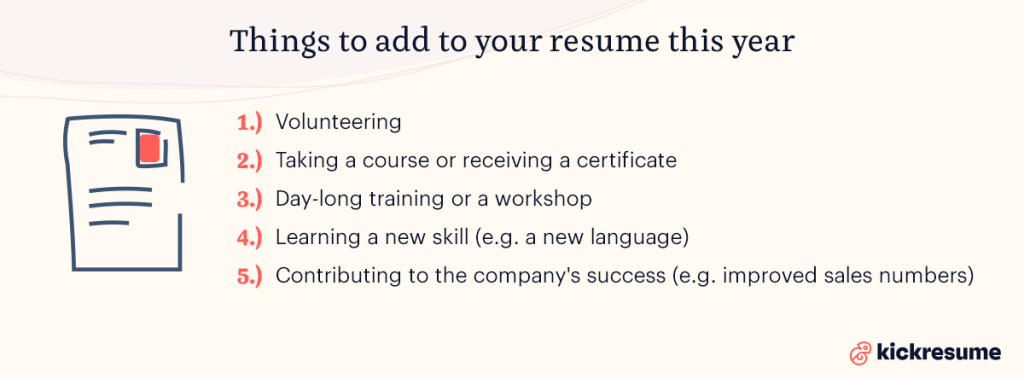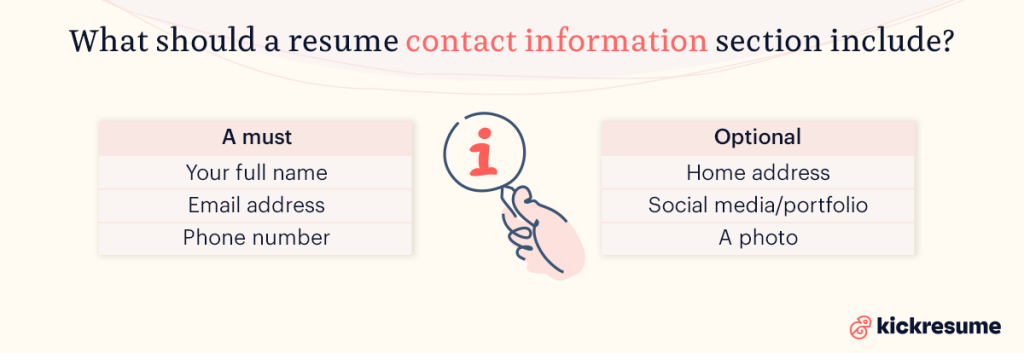The time flies, and we are way into 2025. But has your resume had a chance to catch up? Because updating your resume according to current market trends and requirements will significantly up your chances of landing your dream job this year.
All minor professional accomplishments from this past year — such as a promotion, a new skill, or a training workshop — should be mentioned in your CV. This way, you can stay one step ahead of your competition.
And even if you think that not much has changed in your professional life in these last couple of months, parts of your resume can always be polished, added, or removed.
So let's not waste any time — here are 10 tips on how to give your resume a solid 2025 makeover.
- 1. Take a bird's-eye view of your last year
- 2. Know what to remove and what to keep
- 3. Check your keywords
- 4. Know what to cut out
- 5. Quantify your achievements
- 6. Format your resume well
- 7. Check your contact information
- 8. In 2025, there are no excuses for ugly design
- 9. Make the most out of AI
- 10. Tailor your resume to a specific job opening
- Final tips
1. Take a bird's-eye view of your last year
Sometimes, it's hard to take a step back and objectively acknowledge everything that you've achieved in the past 12 months. Especially if you haven't received a promotion or you haven't changed a job.
However, once you take a look at your career in 2025 from a bird's perspective, you may realize how much you've professionally grown and learned over the past year.
Return to your last year's calendar, scroll through it, and see if you've:
- done volunteer work
- took a course and received a certificate
- joined a day-long training or a workshop
- learned a new skill (e.g. working with software, basics of a new language, leading a project)
- contributed to the company's success (e.g., are the sales numbers better or is there an increase in visitors since you joined the team?)
If you've answered “yes” to any of these, then your resume is asking for an update. Remember, even the smallest accomplishments matter and can make a difference.

2. Know what to remove and what to keep
On the other hand, there might be some parts of your resume that you should get rid of. It's 2025, and no recruiter will be too interested in a detailed description of a task that you completed all the way back in 2005.
Why?
- Recruiters rarely look further than 15 years back unless the information is extremely impressive (e.g. degree from an excellent school) or relevant to the job they are currently hiring for. Otherwise, they're interested in your current skills and recent accomplishments.
- Resume shouldn't be too long. And if you'd include every piece of experience, it would probably lead to pages of experience. The ideal resume should fit onto one or two pages. Definitely not more.
So make sure your resume focuses on your current and recent experience and excludes information irrelevant to your job search.
3. Check your keywords
On average, hiring managers take only fleeting 6.25 seconds to look at your resume before concluding whether you’re a good fit for the position. And most of that time is spent skimming through your personal information and searching for relevant keywords that match the position.
These are the keywords that recruiters usually look for:
- qualities (e.g. experienced/senior/junior)
- credentials (e.g. lawyer/certified nurse/PhD.)
- job titles (e.g. accountant/salesman/developer)
- skills (e.g. (UX/Excel/French/Java)
Moreover, nowadays, most large companies are using ATS systems to filter through dozens of applications that they receive.
Because of that, make sure you include the right keywords in your resume. You should try and use the same ones that are used in the job posting for your desired position. Because if you don't, there is a high chance that your resume won't even be looked at.
4. Know what to cut out
As stated above, the key to a strong resume is to include the right words. But so is AVOIDING the bad ones.
Using irrelevant and cliché buzzwords (such as ambitious, hard-working, or goal-oriented) or lying on your resume won't get you far. Be yourself and be authentic when writing your resume (what a cliché). You want your resume to be a true reflection of yourself and not a soulless template full of half-truths.
Fluffy jargon, clichéd phrases, exaggerations, and the overuse of vague terms are a waste of space.
So go through your resume once more, and if some parts sound like those worn-out phrases that you’ve heard before, feel free to erase them. The easiest way to cut the empty words talk and fluffy talk is to remove adjectives. Replace them with your accomplishments instead, and, most importantly, use action verbs.
So, you should do this:
Instead of this:
Finally, your resume is meant to be your personal profile, giving the recruiter a genuine picture of your personality and skills. It’s always better to put aside the pretense or lies and go for sincerity.
Steer clear from these pitfalls:
- Pronouns like I, my, they, their, that, our, we
- Passive voice and noun-based verbs
- Overused adverbs like efficiently, diligently, or proficiently
- Subjective details like several or a high number
5. Quantify your achievements
There really is no excuse for not quantifying your achievements in 2025. Not only do they look really professional, but they're also able to demonstrate your abilities better than a thousand words.
Just take a look at this example:
It does make a much more persuasive argument about one's outbound sales abilities than a statement like this one, am I right?
6. Format your resume well
Research shows that recruiters prefer resumes that have a good ratio between text and empty space. And what helps you to achieve this spatial balance are bullet points, as they are much more effective in highlighting important data compared to plain paragraphs of text.
In other words, bullet points will make your resume much more skimmable and accessible to the reader. Recruiters can grab the information quickly, and you might be identified as a good fit for the position right away (which is exactly what you want).
Finally, you should also choose the resume format that fits the needs of your career in 2025 the best. These are the three most common resume formats:
- Chronological resume. The most suitable type of resume experienced professionals. “Work experience” is the most important section of this format, so it should be placed right under the contact information. In it, you list your detailed work experiences in reverse-chronological order.
- Functional resume. Choose this format if you’re changing careers this year. The functional format allows you to showcase your transferrable skills. So place the “Work experience” after the “Skills” section and make it shorter than you would in the more common chronological resume format.
- Combination resume. The combination of the two formats above. It allows you to put the relevant information first, but the work experience section should still be quite detailed.

7. Check your contact information
While this point may seem like an easy task to complete, keeping all your contact information up to date can be tricky at times. Once you have an existing resume, it can be tempting to just scroll below the top of the resume and jump over the contact information to pay attention to parts with more text.
However, your resume contact section is of the utmost importance, as that's the place where recruiters look once they like your profile and want to contact you. And you want to make this process as simple as possible for them.
So, have you changed your phone number or email address recently? Or have you moved? Any changes of this nature should be reflected on your professional resume asap.
In the end, your resume contact information section should always include:
- your full name
- professionally sounding email address
- phone number where you can be reached at all times
Optional parts:
- home address (include this if you live close to your potential new job)
- social media/LinkedIn/blog/portfolio (if relevant)
- a photo (if its a norm in your country)
8. In 2025, there are no excuses for ugly design
First impressions matter. And when it comes to resumes, the first impressions are made visually. Strategic use of color or choosing a nice resume template can draw the attention of recruiters directly to your resume.
Color can very effectively make your resume stand out from the sea of competitors.
However, you have to be careful and purposeful when using bolder colors in your resume:
- If you work in a creative industry or a startup, feel free to be more “out there.” Colors are very expressive, and you can showcase your personality and personal style using the design that represents you and your work the best.
- If you're targeting a traditional or corporate role, bold colors might hurt your chances. Therefore, use a simple yet stylish resume template optimized for Applicant Tracking Systems (ATS). If you want to add color, stick to conservative shades of blue, grey, or green.
If you need to pass the ATS and you’re not sure if your resume meets the requirements, try our ATS Resume Checker. It scans your resume across more than 20 criteria, helping to maximize your ATS score.
9. Make the most out of AI
While just a few years ago you had to painfully craft the resume text all by yourself, now you don't have to.
AI seems to be taking over the world (and the job search) in 2025. Utilize it and make the most out of it.
So you're unhappy about some parts of your resume, and you just can't get them to sound right, why not try out an AI resume writer? It will write the first draft of your resume for you, and all you have left to do is to edit and make sure that the information is 100% correct.
It has never been easier to write a resume. That is, if you know where to go.
10. Tailor your resume to a specific job opening
This final tip is relevant at all times, not only in 2025. But we can't repeat it enough.
Many people attach the same resume to all job applications that they send out. But they're are making a mistake.
Recruiters are able to see generic resumes from miles away. Because of that, make sure that you tailor each resume that you send out based on the specific job opening.
Include the relevant keywords, highlight the most relevant experience or education, and leave stuff that is not necessary.
Final tips
- Mention remote work. The shift in work culture has shown us there are more ways to work than the traditional 9-to-5. Remote work is here to stay, and many companies now offer remote or hybrid work, often favoring candidates with prior experience in these setups. So if you have such experience, make sure to highlight it. After all, it's a skill.
- Build your online network. A great resume is a solid start, but why stop there? Show off your skills and professional abilities online! Platforms like LinkedIn—or Behance and Instagram if you’re in the creative industry—can help you expand your network and catch the attention of employers, partners, or clients.
- Continuously update your resume. Relevance is key when it comes to your resume. Regular updates ensure it reflects your latest achievements and shows hiring managers that you’re actively growing in your career.
Finally, if you need more general advice about resume writing, read our full guide on how to write a resume.
This article was recently updated. The original article was written by Jakub Kaprál in 2018.



